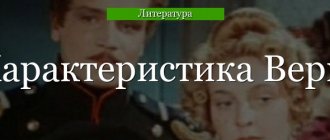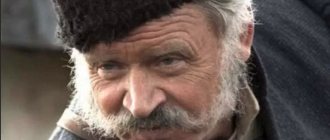Bela
1830s.
The conquest of the Caucasus, which has seen much more “turbulent days,” is nearing completion. “Alien forces,” of course, weigh on the “edge of holy freedom,” and he, naturally, is indignant, but not so much as to block the Georgian Military Road. It is there that the author, an officer of the Russian colonial troops, meets a veteran of the Caucasian War, Staff Captain Maxim Maksimych. Vladikavkaz, where our army men are heading, is not so far away, but ice and a sudden snowstorm force them to stop twice for the night. While drinking tea from a cast-iron teapot, Maxim Maksimych tells an inquisitive fellow traveler, like all people who write and record, a real incident from his life. Now the fifty-year-old staff captain is listed as something like a quartermaster, but five years ago he was still a combat officer - the commandant of a guard fortress and stood with his company in newly pacified Chechnya. Of course, anything happens - “every day there is danger” (“the people are wild all around”) - but in general, with the pacified “savages” the peacemakers live like neighbors, until Grigory Aleksandrovich Pechorin, a brilliant guardsman, transferred to the “boring” fortress, appears into the army and half-exiled to the Caucasus for some scandalous secular offense.
Having served under Maxim Maksimych for about a year, the twenty-five-year-old ensign, so thin and white in appearance, manages to set his sights on the pretty daughter of the local “peaceful” prince, and with the help of Bela’s younger brother, Azamat, kidnap her from her father’s house, tame her, and make her fall in love with him. to passion, and after a couple of months to realize: the love of a savage is no better than the love of a noble lady.
Maxim Maksimych is so simple, but he understands: the romantic enterprise started by Pechorin (out of boredom!) will not end well. It really does end badly: the redistribution of stolen goods. The fact is that Pechorin pays Azamat not with his own gold, but with someone else’s - priceless - horse, the only asset of the daredevil Kazbich. Kazbich, in revenge, kidnaps Bela and, realizing that he cannot escape the chase, stabs her to death.
Analysis of the chapter Taman (Hero of Our Time) essay 9th grade
The chapter “Taman” is the starting point of Pechorin’s adventures in the Caucasus.
This story shows Pechorin's diary, which introduces readers to the spiritual world of the protagonist. The main character describes Taman as a miserable coastal town in Russia, where a hunger strike reigned, and where he was almost drowned. Also, “Taman” is the most mysterious and lyrical chapter of the work. The design of this chapter does not appear from the first lines, since the reader is fascinated by mysterious phenomena and the atmosphere where they occur. The visual means that are used in this chapter are also highlighted: Lermontov not only uses words, but also paints the landscape, characters, and events. The author also perfectly describes the sounds: you can hear the sound of the sea, the songs of the undine girl, as well as the sobs of a blind boy.
The unusualness of “Tamani” is shown in the fact that in this story Pechorin himself evaluates his actions. He believes that everything that happens to him is not accidental.
Pechorin participates in this dangerous situation only in order to solve this riddle. As a result, his strength, will, composure, courage, and determination awakened in him. However, he uses these qualities in the wrong places where they are needed. He only cares about his own interests, he is not interested in other people at all. Therefore, he often ruins the destinies of others by interfering in them out of curiosity. And when the secret of these people was revealed, he understands the purposelessness of his actions.
“Taman” is distinguished by its precision and laconic language. In this chapter, spiritual experiences and difficult mental situations are described in simple and understandable language. This chapter is very extensive in content, but short in length. The story “Taman” is a very important part in the novel; it shows the revelation of the inner world not only of Pechorin, but also of all young nobles at the beginning of the 19th century.
Maxim Maksimych
The “story” told by the staff captain would have remained a travel episode in the “Notes on Georgia”, which the author is working on, if not for a travel surprise: having stopped in Vladikavkaz, he becomes an eyewitness to the unexpected meeting of Maxim Maksimych with Pechorin, who has retired and is heading to Persia.
After observing the former subordinate of the staff captain, the author, a remarkable physiognomist, convinced that a person’s character can be judged by facial features, comes to the conclusion: Pechorin is a typical face, perhaps even a portrait of a hero of the time, life itself made up of the vices of a barren generation. In short: it looks like an ultra-modern, psychological novel, no less interesting than “the history of an entire people.” In addition, he receives a unique document at his full disposal. Having become angry with Grigory Alexandrovich, Maxim Maksimych rashly hands over to his fellow traveler the “Pechorin papers” - a diary that he had forgotten in the fortress during his hasty departure beyond the ridge to Georgia. Extracts from these papers - (“Pechorin’s Journal”).
Taman
The first chapter of this novel in the novel - the adventure short story "Taman" - confirms: the staff captain, with all his innocence, correctly sensed the character of the destroyer Bela: Pechorin is an adventure hunter, one of those senselessly effective natures who are ready to sacrifice their lives a hundred times, only to get the key to the riddle that intrigued their restless mind. Judge for yourself: three days on the road, arrives in Taman late at night, finds it difficult to find a place to stay - the orderly snores, and the master has no time for sleep. The hunting instinct and devilish intuition whisper: the blind boy who let him go “to the Vatera” is not as blind as they say, and the Vatera, even though the hut is lopsided, does not look like a family hut.
The blind man really behaves strangely for a blind person: he goes down to the sea along a steep slope with a “sure step”, and even drags some kind of bundle. Pechorin sneaks behind him and, hiding behind a coastal cliff, continues observation. A female figure is visible in the fog. After listening, he guesses: two people on the shore are waiting for a certain Yanko, whose boat must sneak past the patrol ships unnoticed. The girl in white is worried - there is a strong storm at sea - but the brave oarsman lands safely. Having shouldered the brought bales, the trio leaves.
The riddle, which seemed complicated to Pechorin, is resolved more easily: Yanko brings contraband goods (ribbons, beads and brocade) from overseas, and the girl and the blind man help hide and sell it. Out of frustration, Pechorin takes a rash step: point-blank, in front of the old housewife, he asks the boy where he goes at night. Fearing that the guest will “report” to the military commandant, Yanko’s girlfriend (Pechorin privately calls her an undine - a water maiden, a mermaid) decides to get rid of the overly curious witness. Noticing that she has caught the eye of a passing gentleman, the little mermaid offers him a nighttime, tête-à-tête, boat ride on the choppy sea. Pechorin, who cannot swim, hesitates, but retreating in the face of danger is not in his rules.
As soon as the boat sails a sufficient distance, the girl, having lulled the gentleman’s vigilance with a fiery embrace, deftly throws his pistol overboard. A fight ensues. The little boat is about to capsize. Pechorin is stronger, but the maiden of the sea is flexible, like a wild cat; one more cat throw and our superman will follow his pistol into the oncoming wave. But still, the undine ends up overboard. Pechorin somehow rows up to the shore and sees that the little mermaid is already there. Yanko appears, dressed for camp, and then blind. The smugglers, confident that now, after the unsuccessful attempt, the gentleman officer will probably report to the authorities, inform the boy that they are leaving Taman for good. He tearfully asks to take him too, but Yanko rudely refuses: “What do I need you for!”
Pechorin becomes sad, he still feels sorry for the “poor wretched one.” Alas, not for long. Having discovered that the poor blind man had robbed him, having accurately chosen the most valuable things (a box with money, a unique dagger, etc.), he calls the thief “the damned blind man.”
Princess Mary
We learn about what happened to Pechorin after leaving Taman from the story “Princess Mary” (the second fragment of “Pechorin’s Journal”). On a punitive expedition against the Black Sea mountaineers, he casually meets the cadet Grushnitsky, a provincial youth who entered military service for romantic reasons: he spends the winter in S. (Stavropol), where he briefly meets Dr. Werner, a smart guy and a skeptic. And in May, Pechorin, Werner, and Grushnitsky, wounded in the leg and awarded the Cross of St. George for bravery, were already in Pyatigorsk.
Pyatigorsk, like neighboring Kislovodsk, is famous for its healing waters; May is the beginning of the season, and the entire “water society” is assembled. The society is mostly male, officer society after all, and there is war all around, ladies (and especially not old and pretty ones) are at odds with each other. The most interesting of the “resort girls,” according to the general verdict, is Princess Mary, the only daughter of a rich Moscow lady. Princess Ligovskaya is an Anglomaniac, so her Mary knows English and reads Byron in the original.
Despite her learning, Mary is spontaneous and democratic in Moscow style. Instantly noticing that the wound prevents Grushnitsky from bending over, she picks up the glass of sour, medicinal water that the cadet dropped. Pechorin catches himself thinking that he envies Grushnitsky. And not because he liked the Moscow young lady so much - although, as a connoisseur, he fully appreciated her unusual appearance and stylish manner of dressing. But because he believes: all the best in this world should belong to him. In short, out of nothing to do, he begins a campaign, the goal of which is to win Mary’s heart and thereby hurt the pride of the arrogant and narcissistic gentleman of St. George.
Both of these things work out quite well. The scene at the “sour” spring is dated May 11, and eleven days later in the Kislovodsk “restaurant” at a public ball he is already dancing the waltz that is becoming fashionable with Ligovskaya Jr. Taking advantage of the freedom of resort morals, the dragoon captain, tipsy and vulgar, tries to invite the princess to a mazurka. Mary is shocked, Pechorin deftly repels the lout and receives it from his grateful mother - of course! saved my daughter from fainting at the ball! - an invitation to visit her house is easy.
Meanwhile, circumstances are becoming more complicated. A distant relative of the princess comes to the waters, in whom Pechorin recognizes “his Vera,” the woman whom he once truly loved. Vera still loves her unfaithful lover, but she is married, and her husband, a rich old man, is as persistent as a shadow: the princess’s living room is the only place where they can see each other without arousing suspicion. For lack of friends, Mary shares her heart’s secrets with her cousin (who had the foresight to rent a neighboring house with a common dense garden); Vera passes them on to Pechorin - “she’s in love with you, poor thing,” - he pretends that this doesn’t bother him at all. But women's experience tells Vera: her dear friend is not entirely indifferent to the charm of the lovely Muscovite. Jealous, she makes Grigory Alexandrovich promise that he will not marry Mary. And as a reward for the sacrifice, he promises a faithful (night, alone, in his boudoir) date.
Impatient lovers are lucky: a famous magician and magician comes to Kislovodsk, where the “water society” has moved for the next round of medical procedures. The whole city, with the exception of Mary and Vera, of course, is there. Even the princess, despite her daughter’s illness, takes a ticket. Pechorin rides along with everyone, but without waiting for the end, he disappears “in English.” Grushnitsky and his dragoon friend pursue him and, noticing that Pechorin is hiding in the Ligovsky garden, set up an ambush (not knowing anything about Vera, they imagine that the scoundrel is secretly meeting with the princess). True, they fail to catch the womanizer red-handed, but they make a fair amount of noise - stop the thief, they say!
A Cossack detachment is urgently called to Kislovodsk to search for robbers, that is, Circassians. But this version is for the common people. The male part of the “water society” savors with pleasure the insidious slander against the princess spread by Grushnitsky and his partner. Pechorin, who finds himself in a false position, has no choice but to challenge the slanderer to a duel.
Grushnitsky, on the advice of his second (the same drunken dragoon), suggests shooting “at six steps.” And in order to protect himself (it is almost impossible to miss at six steps, especially for a professional military man), he allows the dragoon to leave the enemy’s pistol unloaded. Werner, who by pure chance found out about the dishonest conspiracy, is horrified. However, Pechorin calmly - and strictly according to the rules of the dueling code - thwarts the fraudulent plan. Grushnitsky shoots first, by lot, but he is so excited that the “sure” bullet only slightly hits his lucky opponent. Before firing back the fatal shot, Pechorin offers his former friend peace. He, in an almost insane state, flatly refuses: “Shoot! I despise myself, but I hate you! If you don’t kill me, I’ll stab you from around the corner!”
The death of the princess's unlucky admirer does not relieve the tension within the love quadrangle. Vera, having heard about the duel at six steps, ceases to control herself, her husband guesses about the true state of affairs and orders her to urgently lay the stroller. After reading her farewell note, Pechorin jumps on his Circassian. The thought of parting forever terrifies him: only now does he realize that Vera is dearer to him than anything in the world. But the horse cannot withstand the mad race - the senseless race for lost, ruined happiness.
Pechorin returns on foot to Kislovodsk, where unpleasant news awaits him: the authorities do not believe that Grushnitsky’s death was the work of the Circassians, and, just in case, decides to send the surviving “combatant” to hell.
Before leaving, Pechorin comes to the Ligovskys to say goodbye. The princess, forgetting about decency, offers him her daughter's hand. He asks for permission to talk to Mary alone and, remembering the oath given to Vera - “You will not marry Mary?!” - announces to the poor girl that he was following her out of boredom in order to laugh. Of course, his feelings for Mary do not fit into this vulgar formula of dislike, suitable only for petty-bourgeois stories. But he is a player, and the most important thing for a player is to keep a good face when playing poorly. And with this - alas! - it's nothing you can do! Style is a person, and our hero’s lifestyle is such that he, seemingly unwillingly, destroys all living things, no matter where this living thing is found - in a mountain hut, in a wretched mud hut or in a rich noble nest.
Summary
Grigory Pechorin, due to his military service, had to go to the poor city of Taman, in which everything looked bad to him. The officer was nearly drowned and almost died of starvation. This city made the hero sad.
Grigory arrived in the town late at night, explaining to the sentries the purpose of his arrival, he demanded to find him a place to spend the night. The hero looked in vain for housing in the town ; they could not accept him anywhere. He was only able to rent an apartment near the seashore. The foreman brought him there, but warned him that this place was unclean.
At first the officer thought the house was vacant. He began to knock on the door many times, and after a while a blind boy came out onto the threshold. Pechorin asked where the owner of the apartment was, he replied that she was not there, as she had gone to the settlement.
The boy led the officer and the Cossack who was carrying his suitcase into the house. Looking around, Pechorin noticed that there was almost nothing in the house of furniture, except for a few benches, a chest and a table. It smelled of dampness, and, to the officer’s surprise, there were no icons.
At night on the shore
Grigory laid out his things and went to bed. However, sleep did not come to him. Suddenly the hero noticed a shadow flashing outside the window. The officer came out of the hut and saw the same blind boy carrying a bundle under his arm. He walked down the steep path very confidently for a blind man. Pechorin was curious where the boy was going, and he followed him. On the shore, the boy met some woman. Despite the strong wind, Grigory managed to hear their conversation; they were discussing Yanko. The woman believed that he would not come because of bad weather, but the boy disagreed with her.
While they were talking, a boat appeared on the horizon and slowly moored to the shore. A man of average height in a sheepskin hat came out of it, he waved his hand to those standing on the shore, and together they began to unload the boat. From the fragments of dialogue that the officer managed to hear, he realized that the sailor was a smuggler. Soon Pechorin lost sight of them and went to bed.
Meeting with a mermaid
The next morning the old housewife returned. Pechorin decided to tell her what happened last night. But she turned out to be deaf and therefore did not answer any of the tenant’s questions. The irritated officer rushed to the boy and grabbed him to find out the truth, but he did not say anything about his nightly adventures, but only cried.
Pechorin was sitting on a bench near the house when he saw a girl with loose hair standing on the roof. She looked into the distance of the sea and sang about a boat that was carrying precious things and got into a storm. The girl looked like a mermaid. A wonderful voice gave her away, and the officer realized that it was she who had been on the shore last night.
Throughout the day, the heroine flirted with Gregory and tried to charm him. The hero kept trying to ask her leading questions, but the mermaid did not give an exact answer to any of them and generally looked strange. In the evening, Pechorin stopped her at the door and honestly told Ondine about everything he had seen and heard on the seashore. Then Pechorin threatened the girl to tell everything to the commandant. She just laughed in response and left. Grigory was surprised by this reaction.
When darkness fell, it was time to drink tea. Before Pechorin had time to take his first sip, Ondine ran into the house, hugged him and kissed him deeply. The officer was about to reciprocate her feelings, but the girl suggested meeting at night on the shore and left.
Character Fight and Departure
Observing the situation, the main character remains perplexed as to why he ended up here and interfered with the lives of other people. He disturbed their quiet life and almost drowned himself.
Upon returning home, the officer noticed that some of his personal belongings were missing. He was a little angry, but decided to leave everything as it was. At dawn, Pechorin left Taman, leaving only negative memories of the city.
A brief retelling of “Taman” tells the story of the main events of the episode and reveals the personality of Pechorin himself and his attitude towards himself.






